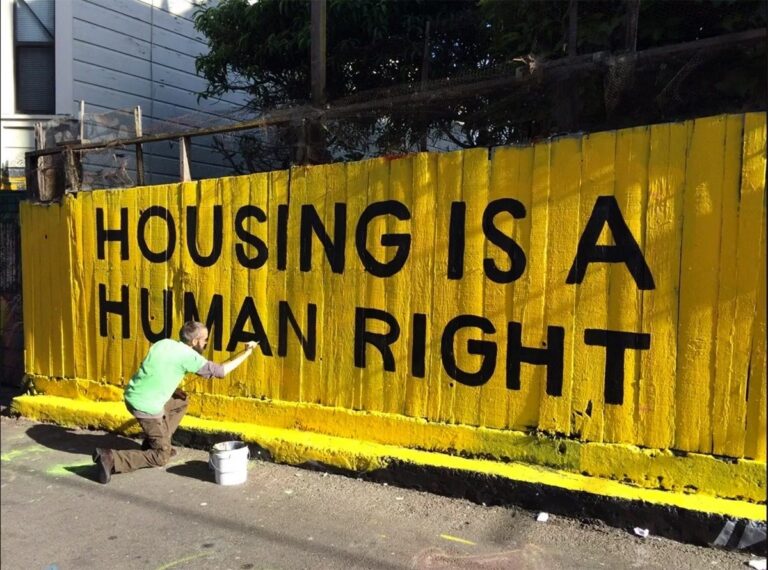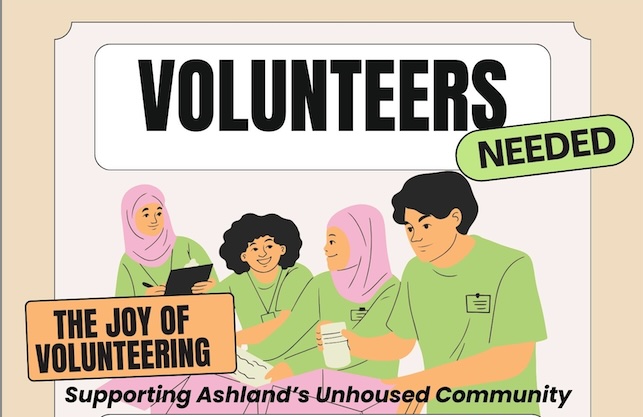By Kerul Dyer
For the past nine months, the Homeless Services Masterplan Committee has worked to identify action opportunities for the City of Ashland to take to address homelessness in our community. The group, comprised of 11 volunteers, two City Council liaisons, and a member of the Ashland Police Department, took the time to hear from a wide variety of constituents about services and needs related to unhoused residents of Ashland. The result is the comprehensive guidepost titled The Homeless Services Masterplan.
“The Ashland Community has taken the steps to use reliable data, public input and community values to make positive steps in a crucial housing emergency,” said Rich Rhode, who helped to develop the Masterplan and serves on Ashland’s Housing and Human Services Advisory Committee. “Everyone deserves a place to call home.”
The Homeless Services Masterplan aims to “outline the City’s role in providing and supporting resources and services that address the issues of homelessness in the Ashland community.” The Housing and Services Advisory Committee is scheduled to review the Masterplan on July 18. Then it will be presented to the Ashland City Council August 5.
“The first 13 pages of the document provide takeaways, or action opportunities, that the city of Ashland can take now to help deal with homelessness in the city,” continued Rhode. “We surveyed and interviewed hundreds of individuals, businesses, and service agencies while gathering information. All of them were carefully considered when we compiled the Masterplan.”
According to Rhode, the remaining pages of the Masterplan are the underlying evidence of how the priorities were determined by the committee. He continued, “the public has had a really strong ability to engage this document, as well as a great understanding of the service programs that went into it.”
Action opportunities on ‘livability’ include:
- Provide multiple locations for electronics charging and Wi-Fi access.
- Increase the number of public restrooms and access to drinking water.
- Expand access to showers and laundry facilities.
- Develop a daytime lockable storage program where unhoused people can store their belongings while navigating other resources, employment, etc.
- Create a day center/respite from outdoors, with access to water, bathrooms, and resources.
- Establish a winter shelter for seniors and other vulnerable populations that is open 24/7 from mid-November through mid-April; explore healthcare partnerships to address chronic, acute, and emergent needs.
The committee also concluded the following for long term change:
- Approach issues of homelessness from a public health, mental health, and social service perspective. Advocate for quality, effective, and evaluated services.
- Improve neighborhood livability through infrastructure development and community-building strategies (both structural and social avenues).
- Participate in the development of a countywide strategic plan to address / end homelessness. Ensure research-based strategies and promising practices.
- Develop a strategic plan to address / end homelessness in Ashland; identify community goals and metrics for success.
- Implement the Ashland Housing Production Strategy.
On the budget side, the Committee also dug into the funding streams for various services and projects, including Federal, State, county, and municipal sources. To this end, the Masterplan lays out menthods that include maximizing resources and funding strategies to achieve the goals outlined in the report.
The plan offers the following action opportunities for funding:
- Develop federal and state Legislative Agendas related to issues of homelessness, ranging from eviction prevention to homeless response to affordable housing and development.
- Educate and advocate for federal and state funding to address homelessness in Ashland and the greater region/county.
- Increase financial resources through grant writing
- Provide grant-writing assistance to homeless service providers.
- Monitor the capacity and use of homeless service programs in an effort to maximize use.
Finally, the plan expressed the importance of working in collaboration with other regional efforts, rather than going at it alone. The Strategic Alliance section of the Masterplan contained concrete steps on how to make that happen.
Proposed action opportunities that the City could:
- Strengthen City of Ashland participation in the Jackson County Continuum of Care.
- Leverage existing relationships (intergovernmental, economic, social, etc.) to increase communication, coordination, and collaboration around issues of homelessness.
- Facilitate coordination of current health service providers (e.g. Max’s Mission, ACCESS, JCMH, La Clinica, HIV Alliance, Pathfinders/other peer support); host mini summits.
- Convene an interdepartmental team to keep pace with and address issues of homelessness in Ashland.
Rich Rhode has worked for decades to support economic and social justice in Southern Oregon. He is an active member of Southern Oregon Housing for All (SOHFA), a “coalition of tenants and community advocates who fight to ensure that everyone has a place to call home.” Learn more about SOHFA here.


